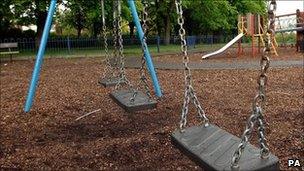'Playground shortage' affects children in England
- Published

Campaigners say ministers are not measuring the effect of spending cuts on children
Children in England are missing out on play because of a shortage of outdoor areas, according to a campaign group.
Fair Play for Children got responses from 300 councils in England about the number of playgrounds provided.
The survey revealed there was one for every 694 children, and about 752 children per acre of play area.
The government says councils are getting more freedom to choose how they spend money, with communities more able to influence playground provision.
However, Fair Play for Children's national secretary Jan Cosgrove said this localism agenda risked seeing councils "pushing children and their play into the margins".
The group campaigns for the recognition of children's right to be play.
Its research showed there were 16,134 playgrounds in England, serving an estimated 11.2 million children aged under 16.
'No consultation'
The total acreage of these play areas was estimated at under 15,000 acres. By comparison, Mr Cosgrove suggested 3.5 million golfers enjoyed courses totalling about 190,000 acres.
"It is abundantly clear from this that children's outdoor play needs are not being met by current playground provision or acreage," he said.
He said there had been a lack of government consultation with communities, parents and children on the issue.
No measure was being taken of whether children's play was suffering as a result of public spending cuts, he added.
Councils reported through the survey that plans to build or revamp 279 playgrounds across England had to be axed because of spending cuts.
Education Secretary Michael Gove froze grants awarded to community playground schemes in 132 council areas last August, as the coalition moved to reduce the budget deficit.
"The government cannot have it both ways, to say they know the importance of play in children's development and health and yet not know the effects of their policies nationwide," Mr Cosgrove said.
"Words about childhood obesity and concern for lifestyles cut little ice when it is clear there is a national crisis affecting our children's basic ability to be able to get out and play."
A Department for Education spokesman acknowledged the importance of safe, free, local places to play, and the benefits they brought to the wider community.
He said: "The government is giving councils more freedom over how they spend their money, giving communities more control over developments in their neighbourhoods, and making it easier for volunteers and charities to get involved.
"This should provide the opportunities for committed people and local groups to continue to influence play provision in their areas."
- Published11 August 2010